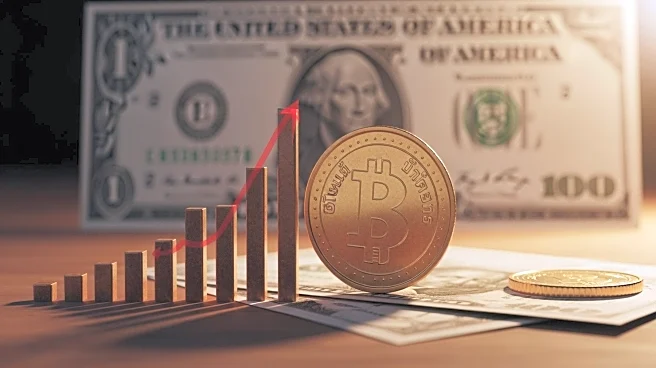What's Happening?
The Thai baht has shown a strengthening trend against the U.S. dollar, marking a 0.28% increase to 32.43 per dollar as of Thursday morning. This movement comes after the baht traded within a range of 32.430 to 32.540, ending the previous session at 32.52
per dollar. The data, provided by LSEG, indicates a positive shift for the baht amidst broader market dynamics. The strengthening of the baht is part of a larger trend observed in emerging markets, where currency fluctuations are influenced by various economic factors, including trade balances and investor sentiment.
Why It's Important?
The strengthening of the Thai baht against the U.S. dollar is significant for several reasons. For Thailand, a stronger baht can impact export competitiveness, as goods become more expensive for foreign buyers. Conversely, it can benefit importers and consumers by reducing the cost of foreign goods and services. For investors, currency fluctuations can affect returns on investments in Thai markets, influencing decisions on capital allocation. Additionally, this trend may reflect broader economic conditions in emerging markets, where currencies are often sensitive to global economic shifts and policy changes.
What's Next?
The future trajectory of the Thai baht will likely depend on several factors, including Thailand's economic policies, global market conditions, and investor sentiment. Stakeholders such as exporters, importers, and investors will be closely monitoring these developments to adjust their strategies accordingly. Potential reactions from the Thai government or central bank could include measures to stabilize the currency or address economic impacts. Additionally, global economic trends, such as changes in U.S. monetary policy or international trade agreements, could further influence the baht's performance.
Beyond the Headlines
The strengthening of the Thai baht may also have cultural and social implications, as currency value can affect tourism and international relations. A stronger baht might deter tourists seeking cost-effective travel options, impacting Thailand's tourism industry. Moreover, currency strength can influence perceptions of economic stability and growth, affecting Thailand's international standing and diplomatic engagements.
















